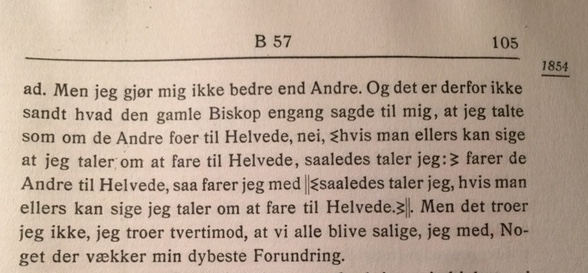
I wrote earlier about how I had recently discovered a thinker, George MacDonald (1824-1905), whose views were very similar to Kierkegaard’s. What I don’t know is whether MacDonald was familiar with Kierkegaard’s work, and if so, to what extent. My post on Kierkegaard’s early reception in Germany provides evidence to support that MacDonald likely had at least some exposure to Kierkegaard’s works, both in German translation and via reviews and responses to those translations in German theological journals.
I still haven’t had time to do any research on the extent of MacDonald’s exposure to Kierkegaard. That would require tracking down which books MacDonald personally owned, which books and periodicals would have been available to him in the libraries he used, and going through all his correspondence in search of any mention of Kierkegaard. I did, however, stumble across a reference in the second volume of MacDonald’s Unspoken Sermons that I believe provides further support for the view that MacDonald may have been influenced by Kierkegaard. The sermon in question is entitled “The Word of Jesus on Prayer.” “Convince me,” protests MacDonald’s imaginary interlocutor, “that prayer is heard, and I shall know. Why should the question admit of doubt? Why should it require to be reasoned about? We know that the wind blows: why should we not know that God answers prayer?’
MacDonald replies, “What if God does not care to have you know it at second hand?”
Kierkegaard scholars will immediately recognize not merely the expression, “at second hand,” but also the precise sense in which MacDonald uses it here, as identical to Kierkegaard’s use of it in Philosophical Crumbs and the Concluding Unscientific Postscript.
My first thought, actually, was that this philosophical-theological use of the expression “at second hand” might actually have a biblical origin. I did a word search on both the King James Version and the Revised Version (to which MacDonald makes frequent reference in his writings) of the Bible, but could not find it in either version. That doesn’t preclude, of course, that both Kierkegaard and MacDonald got the expression from some third source independently of each other, so if any reader knows of such a source, I would be very much in your debt if you would share it with me.
The question of the relation between Kierkegaard and MacDonald raises another interesting issue. MacDonald was a universalist. Was Kierkegaard? I don’t mean to suggest that MacDonald would have gotten his universalism from Kierkegaard, because if Kierkegaard was a universalist, that is far from obvious. There are scholars who appear to think he was, and there are places in Kierkegaard’s works that suggest he may have had universalist leanings. Kierkegaard famously says, for example, in Crumbs that if a person did not receive the condition for understanding the truth from the god (i.e., Christ) in this life, “[i]f they met each other in another life, this teacher would again be able to give the condition” (Crumbs, p. 95). Since the “condition” in question is faith, the implication is that those who lack faith, for whatever reason, are not damned to hell for eternity, but will have multiple chances to attain it. Kierkegaard may even have believed that the faithless would continue to be presented with such chances until, finally, they did receive it.
The difficulty with this interpretation, apart from its apparent reliance on the doctrine of reincarnation, is that the passage in question continues “[b]ut one who had once received it [but lost it again] would be a stranger to him,” because “[t]he condition was something entrusted, for which the receiver would always be required to give an account” (Crumbs, p. 95). That doesn’t mean that someone who had not had faith in this life would be damned to hell, but it does have ominous implications for those who had faith in this life and then lost it.
There are multiple references to hell in Kierkegaard’s writings (though, interestingly, exponentially more references to hell in the commentaries on Kierkegaard’s writings in the new Søren Kierkegaards Skrifter than in the writings themselves). Even that doesn’t necessarily mean, however, that Kierkegaard believed in eternal damnation because MacDonald also refers occasionally to hell, though as a place of corrective rather than retributive punishment.
A casual search I did on the online edition of Søren Kierkegaards Skrifter was not encouraging for those of us who would like to think of Kierkegaard as a universalist.
I discovered a place in Kierkegaard’s journals where he says: “The NT [i.e., New Testament] is clearly based on the view that there is eternal damnation” (JN vol. 9, p. 262).
It’s possible, of course, to argue that Kierkegaard did not feel compelled to agree with everything in the New Testament.
“In an article in Nordisk Kirketidende,” Kierkegaard writes, “Fenger from Slotsbjergbye wrote affirming the eternity of punishment in hell and scoffing at the Christians who imagine themselves to be Christian without having heaven-hell. From a Christian point of view he is right” (JN vol. 11: Part 2, p. 345, emphasis added.)
The rest of the entry goes on to argue that there is insufficient concern among Christians for the situation of those who may be damned to hell for eternity and that Fenger was himself among those whose concern seemed insufficient. It is conceivable, of course, that Kierkegaard was simply pointing out that, if there were a hell to which God damned anyone eternally, as so many Christians believe, then Christians should be far more concerned with the spiritual situation of their fellow man then they tend to be.
I’m sympathetic to such attempts to preserve the possibility that Kierkegaard was a universalist. It’s not only more morally appealing than the view that some people would be damned to hell forever, it actually seems to cohere better with the basic tenets of Christianity. I’m inclined to agree with Keith DeRose, Allison Foundation Professor of Philosophy at Yale who writes
Universalism is far from a mere doctrine of barren theology; many, like Paul, find great joy in the belief. Part of the joy some find is in the thought that not only they, but their fellow humans, will, eventually at least, experience everlasting life with Christ. But, like Paul, you may find the joy is focused rather on God, and on how wondrous and complete a victory will be won by the God “who desires everyone to be saved” (I Timothy 2:4). And, on the other side, the non-universalist picture may come to look strangely dim, not exclusively because of the awful fate that awaits some of your fellows on this picture, but because God is deprived of such a complete victory, and, in winning only a partial victory, his desire that everyone be saved will ultimately be frustrated.
(“Universalism and The Bible”).
That is, not only does the idea of eternal damnation fail, I would argue, to cohere with the idea that God is love, it also fails to cohere with the idea that God is omnipotent. God desires that everyone should be saved, but then everyone isn’t saved? So God doesn’t get what God wants? If God truly desires that everyone should be saved as I Timothy 2:4 (among other biblical passages) suggests, but everyone isn’t saved, then God is outright defeated, which suggests that he isn’t omnipotent.
But if Kierkegaard was a universalist what is one to make of passages such as the two above, as well as the one in Works of Love where Kierkegaard asserts that Christianity “discovered” (opdagede) what the world found ludicrous — the idea of “eternal damnation” (evig Fortabelse)”? Is it possible that such passages were simply hyperbole? Kierkegaard was always concerned with the effect his writings would have on others. Is it possible that he thought the idea of universal salvation just wouldn’t be very helpful to people in that it would incline them to take Christianity less seriously if they felt everyone would eventually be saved?
There is an intriguing passage in the Hongs’ translation of Kierkegaard’s Journals and Papers that suggests that may in fact have been the motivation for his references to eternal damnation (though the fact that some of these references are in his journals and papers poses problems for such a thesis). The passage in question makes a pretty unequivocal statement in favor of the idea of universal salvation. It reads:
“[W]at the old bishop once said to me is not true — namely, that I spoke as if others were going to hell. No, if I can be said to speak at all of going to hell, then I am going along with them. But I do not believe that; on the contrary, I believe that we will all be saved, I too, and this awakens my deepest wonder” (JP vol. 6, p. 557).
The problem is, I could not find this passage in the new Journals and Notebooks (2007-2019). Nor could I find it in the new Søren Kierkegaards Skrifter (1997-2013) I did find it, however, in Vol. 11, Tome 3, p. 57 of the purportedly superseded Søren Kierkegaards Papirer (1909-1948). Since that provided me with the actual wording of the original Danish I plugged the wording into the search function of the online edition of SKS.
Nothing!
I will leave open the question of whether the omission of what appears to be an absolutely essential passage from Kierkegaard’s papers from both the new Danish and English editions of Kierkegaard’s journals and papers, editions that purport to be complete, is part of a conspiracy to conceal from the public that Kierkegaard subscribed to a doctrine that most denominations of Christianity (and the Danish Lutheran Church in particular) consider heretical.
One thing is clear, however, both the new Søren Kierkegaards Skrifter and the new Søren Kierkegaard’s Journals and Notebooks are deeply flawed, as one might guess by comparing how few years were put into their production relative to how many years were put into the production of the older Papirer The new Skrifter was produced in only 16 years and the Journals and Notebooks, which was based on the Skrifter, was cranked out in only 12 years, as opposed to almost forty years that was put into the production of the Papirer.
Serious Kierkegaard scholars will need to continue to use the earlier Kierkegaard’s Journals and Papers and Søren Kierkegaards Papirer. Fortunately, it is still possible to get your hands on these invaluable works. I found a copy of the Journals and Papers on Ebay for $125.00 for the whole set, and another on abebooks.com for $495.00. I also found a set of the Papirer for 660 euros, and sets do occasionally appear for sale by Danish antiquarians. Both the Journals and Papers and the Papirer will become increasingly hard to find, though, so if you are serious about Kierkegaard scholarship and you do not already own these works, I urge you to buy them now!


 The day I posted “
The day I posted “